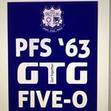Farouk Gulsara's Blog, page 86
November 3, 2020
Time for re-assessment?
Putham Pudhu Kaalai (புத்தம் புதிய காலை, A brand new dawn, Tamil; 2020)
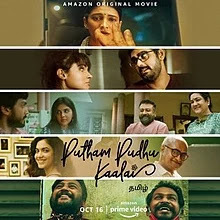 The recent Covid pandemic and the uncertainties related to it made many to question the real meaning of life. Is all rat race really worth it? What are we actually chasing? What is the endpoint - is it that we would one day stop waking up but the whole world continuing despite our absence? The generation next is too embroiled in their own quagmire to give two hoots to your geriatric problems. Then what? Just wither away to the dark forces of Nature?
The recent Covid pandemic and the uncertainties related to it made many to question the real meaning of life. Is all rat race really worth it? What are we actually chasing? What is the endpoint - is it that we would one day stop waking up but the whole world continuing despite our absence? The generation next is too embroiled in their own quagmire to give two hoots to your geriatric problems. Then what? Just wither away to the dark forces of Nature?
Given the restrictions that COVID imposed on the film industry, five screenwriters came up with five different tales that used the Indian national 21-day lockdown as the backdrop of stories. Somehow the isolation helped the characters to reassess the life await of them, embrace the changes and make amends of their past. And not to miss the twist at the end of the last snippet titled 'Miracles'. Indeed miracles work in mysterious ways.
In the first story ('llamai Etho Etho', 'here here youth'), an older couple, both widowed, try to hook up on the sly without the knowledge of their respective adult children. The exciting thing is that the moment they meet they are transformed into their younger selves (literally on the screen; their role assumed by younger actors). Soon lockdown is announced, and it becomes an opportune time to discover each other's highs and lows, warts and all. Society limits the expression of passion to the youth as if the aged are not capable or need for passionate love. Without longevity and improvement in health, is there a place for companion of the opposite gender? Or old age is merely a time to improve one's intellect or perform tapas to enhance one's standing in the karmic cycle?The second offering ('Avarum Naanum, Avalum Naanum' - 'He and Me - She and Me') illustrates the many ill feelings that people carry on in their lives. Many of these can be just sorted out by straight face-to-face civil interaction to hear out each other's point of view. This, a granddaughter found out when she reluctantly agreed to babysit her grandfather and lockdown was instituted. She learnt that oldies are not mere dinosaurs who are stuck in the glue of the past. They also try to keep in sync with the winds of change.
Maybe the next one ('Coffee anyone') is kind of over the top. A comatose 75-year-old lady with pontine haemorrhage is discharged home after spending two months in ICU. Her two daughters, from the US and UK, drop in to spend time and celebrate her birthday. The third daughter who had left home over differences in career choices is not in good terms with her parents. This story questions the merits of strict parenting, the outsourcing of parenting duties as practised by modern parents and the traditional Indian type of parents hawking of children's every academic performance.
 The fourth story ('Reunion') highlights how the hard knocks of life sometimes leave considerable dents in people's lives. Not everyone has the wisdom from their experiences but instead, fall prey to the dark forces. In the episode, an old school mate turns up at an old friend's house. She is placed under house arrest during the lockdown. Her cocaine sniffing habit comes to light, and the lockdown becomes the best time to detox.
The fourth story ('Reunion') highlights how the hard knocks of life sometimes leave considerable dents in people's lives. Not everyone has the wisdom from their experiences but instead, fall prey to the dark forces. In the episode, an old school mate turns up at an old friend's house. She is placed under house arrest during the lockdown. Her cocaine sniffing habit comes to light, and the lockdown becomes the best time to detox.Unlike the previous stories which are set in more aesthetic homes, the final presentation takes place in the less glamourous of sites. It involves lowly petty thieves and a financially depleted movie maker. Convinced that motivational guru is referring to them when he keeps on saying on TV that he foresees a miracle coming their way. The thugs get the news that a business has hidden his ill-gotten gains in an abandoned car. They decide to look for it.
Everything is a miracle if we appreciate their existence. The fact we can breathe and enjoy things around us with our fully intact senses itself is the biggest miracle. Why look for another?
 This work is licensed under a Creative Commons Attribution 4.0 International.
This work is licensed under a Creative Commons Attribution 4.0 International.
http://asok22.wix.com/real-lesson
http://.facebook.com/farouk.gulsara
www.riflerangeboy.com
This work is licensed under a Creative Commons Attribution 4.0 International License.

October 31, 2020
The rest, all side show.
Thithi (ತಿಥಿ, Lunar day, Kannada; 2015)
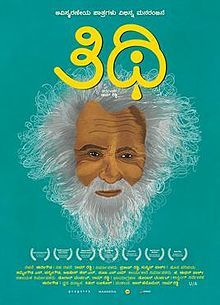 Our wants and needs vary as we grow older (and hopefully wiser). In the spring of our youth, we are brimming with raging hormones. Our biological needs somehow shut off our cognitive powers. The pudendal nerve and illusive higher centres control the more rational neuronal connexions. Unfortunately, the seeds and the ghosts of our action persist in haunting us in the later phase of our lives.
Our wants and needs vary as we grow older (and hopefully wiser). In the spring of our youth, we are brimming with raging hormones. Our biological needs somehow shut off our cognitive powers. The pudendal nerve and illusive higher centres control the more rational neuronal connexions. Unfortunately, the seeds and the ghosts of our action persist in haunting us in the later phase of our lives.Supposing we pass through youth unscathed, in the next phase of our lives, stuck with baggage of our past, we are expected to provide for our kin. Social hierarchy dictates we are responsible for the seeds that we sow. The emphasis of life is to provide for the living and to accumulate material wealth for an uncertain future. If we are 'cursed' with a long but unproductive life, we have to fend for ourselves. Conversely, a short affluent one will only benefit the dependants.
After completing the deeds that we are assigned to do, to fulfil our karma, we finally understand everything. The dents and blows of the Hard Knock School of Life open our eyes to reality. The heartaches and betrayals lay bare the illusory nature of life. We become pessimistic. Somehow, all our prior chase for material and bodily gratifications do not matter anymore. That is when others think we are fools.
This simple neo-realistic movie using non-professional actors utilising natural backdrops and naked sounds of nature is a multiple-award-winning offering from the Kannada cinema, often labelled as Sandalwood. It tells the tales of a centenarian, Century Gowda, who dies suddenly. Gowda had been a hunk in his heydays, and that created a rift between him and his son, Gaddappa. Gaddappa is disillusioned with material things and prepare to live as an ascetic (or vagabond, pick your choose). Gaddappa's son, Tamanna, is a householder who is striving to keep his family intact minding his sugar cane plantation and erratic water supply. Tamanna's son, Abhi, a loafer who gets on by doing odd jobs and surfing porn on his mobile phone, and has both his eyes hooked on a pretty goat shepherd girl.
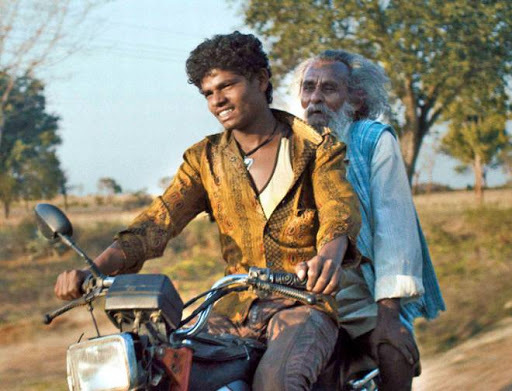 The rest of the tale tells about Tamanna, fed up with his father, Gadappa's, lackadaisical attitude with life wanting to sell off his grandfather's land to support his family. Unfortunately, Gadappa does not want to write off the plot of land to his son. Tamanna then plots a convoluted plan to create a fake death certificate of his father whilst sending him off on an extended vacation towards this end.
The rest of the tale tells about Tamanna, fed up with his father, Gadappa's, lackadaisical attitude with life wanting to sell off his grandfather's land to support his family. Unfortunately, Gadappa does not want to write off the plot of land to his son. Tamanna then plots a convoluted plan to create a fake death certificate of his father whilst sending him off on an extended vacation towards this end. The story shows us how these members of the three generations are embroiled in their own shenanigans as each of them pursues their own purpose in life. It all ends up in a twisted comedy of errors. The rest of the villagers are there to enjoy the party; the party being the final funeral rites of Century Gowda. Here, they celebrate his full life by feasting on the family's mutton meal and the stage show that was arranged. The rest is all sideshow for them.
 This work is licensed under a Creative Commons Attribution 4.0 International.
This work is licensed under a Creative Commons Attribution 4.0 International.
http://asok22.wix.com/real-lesson
http://.facebook.com/farouk.gulsara
www.riflerangeboy.com
This work is licensed under a Creative Commons Attribution 4.0 International License.

October 29, 2020
Seeing is believing?
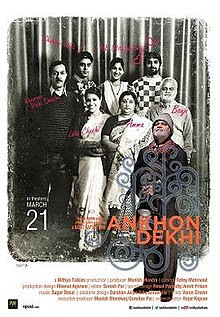 On one end, we are told not to accept everything related to us without prior investigations. We have been thought to sieve, evaluate, ponder, perambulate and scrutinise thoroughly before believing anything to be true. Even then, sometimes, our senses deceive us. Seeing is believing, they say, but in the same breath, they say the world is an illusion, Maya, a mirage: so many names.
On one end, we are told not to accept everything related to us without prior investigations. We have been thought to sieve, evaluate, ponder, perambulate and scrutinise thoroughly before believing anything to be true. Even then, sometimes, our senses deceive us. Seeing is believing, they say, but in the same breath, they say the world is an illusion, Maya, a mirage: so many names. On the other end, we are also cautioned that specific unwritten rules cannot or should not be questioned. This includes queries on divinity, scriptures and belief systems. They have a name for it, blasphemy, and the punishment does not look pretty.
It is said that we only use 10% of our brain. Like much of our chromosomal loci which remain dormant, so is our brain. Would we be at a different level of civilisation if we were to utilise the remaining unused part of the mind? Or perhaps we would just be more creative in annihilating each other? Just to recapitulate, serial killers and psychopaths have extremely high IQs.
A 50-something-year-old man, Babuji, is going through an existential crisis of sorts. After discovering that his daughter's boyfriend is not as much a loafer as everyone describes him to be, Babuji takes a vow to also see things from his perspective; no more listening to hearsay. The problem is that he took the whole idea to the limit. He was sacked from his job at a travel agency when he refused to promote tourists' destinations as he had never seen them. Babuji quit his job as he thought it was based on a lie. Just lying around the house, jobless created friction with his younger brother who decided to move out.
His new outlook also helped Babuji to look at things from another angle. He appreciated things after a first-hand experience and expanded his knowledge in making money in a poker game. His one lifelong ambition was to experience the joy flying like a bird, to feel the cold gush of wind cutting through his bare skin as he scaled down a height in the free skies. But, as they say, be careful of what you wish for.
The character in the film reminded me of a sad incident that unfortunately happened to a friend's son. With the ease of access to knowledge to the studies of the occult and realms of the unknown, the curious young man thought that cyberspace was God sent. Exploring into readily available articles online, he delved deeper and deeper into secrets of life and Consciousness. He soon went in-depth to examine questions of Death. He was recruited (it was proposed later on) into a cult which wanted to experience Death. It was later discovered that he succumbed to smothering in a freak accident as he was performing experiments inducing asphyxia with a plastic bag. Sometimes, one wonders whether the human mind is capable of dealing with the Truths of the Universe. Are some things better left unanswered?
An entertaining movie minus the usual clutter that is often seen in most mainstream movies.
 This work is licensed under a Creative Commons Attribution 4.0 International.
This work is licensed under a Creative Commons Attribution 4.0 International.
http://asok22.wix.com/real-lesson
http://.facebook.com/farouk.gulsara
www.riflerangeboy.com
This work is licensed under a Creative Commons Attribution 4.0 International License.

October 27, 2020
Is it an imagined war or a real one?
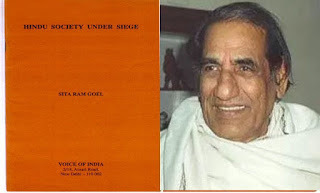 Hindu Society Under Siege (1981)
Hindu Society Under Siege (1981)
Sita Ram Goel
Hindu culture has a very long history. Its history goes back beyond 2500 BC. Recent astronomical calculations as referred to Valmiki's description of planetary constellations during Lord Rama's date of birth ascertained his birth as 5114 BC. Similarly, Mahabharata's account of Krishna's birth puts his date of delivery as 3228 BC. Suppose the scriptures and old temples were anything to go by, nothing stops us from assuming that Bharat indeed had a highly developed civilisation long before any Western force set foot in the land beyond the Indus Valley.
Being the accommodating hosts and the inquisitive philosophers there were, they embraced all cultures with open arms. In the quest in search of the eternal truth, they accepted other routes towards this end.
Over the generations, the visitors have tried to impress upon the hosts of their superiority and demean India's age-old traditions. According to the author, centuries of colonisation have left India with three groups who are out derailing the peace of the Nation, precisely, the Hindu society which boasts of having people who profess the third most popular religion in the world.
Goel has always been a controversial figure. He had been censored after criticising history and doctrines of Islam. His reprint of his contemporary, Ram Swarup's 'Understanding Islam through Hadis' created a furore got him arrested. He was also outspoken on his criticism of Christianity as well. Pandits like David Crowley and Koenraad Elst, on the other hand, described him as an 'intellectual Kshatriya' possessing unparalleled strong rationalistic point of view that did not compromise the truth for politeness.
In this book, he zeroes on three groups that are out to destroy the harmony of the Nation. Firstly, the most malevolent of these residues is Islamism, the rubble of the Muslim invasion of India that spread over several centuries, that find difficulty in integrating with the rest of the country but takes pride in the purity of its Arab, Persian or Turkish descent. Like Ambedkar, he accused Islam of not being
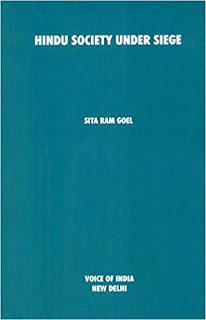 Goel was also outspoken in his criticism of Christianity. He asserted that secularism vilified Hinduism but ended up glorifying Abrahamic traditions. The evangelistic nature of the religion further slandered and ridiculed other belief systems. Free flow of Western wealth is used towards this end. In the North East region of India, the breaking forces have successfully steered them from their ancestral belief and go as far as to demand autonomy from India.
Goel was also outspoken in his criticism of Christianity. He asserted that secularism vilified Hinduism but ended up glorifying Abrahamic traditions. The evangelistic nature of the religion further slandered and ridiculed other belief systems. Free flow of Western wealth is used towards this end. In the North East region of India, the breaking forces have successfully steered them from their ancestral belief and go as far as to demand autonomy from India.The third modus operandi of the invaders to debase their religion of the land is through what Goel referred to MacCaulayism. This term refers to Thomas Bablay MacCaulay, the Governor-General of India, who in 1830, proposed a significant revision of replacing the preexisting indigenous education system to produce a class of Indians brown of skin but English in taste and temperament. They look down at anything Indian. In their mind, the Indian civilisation is nothing but one with animistic belief, with rudimentary instructions in arithmetic, and reading and writing imparted by semi-educated teachers, mostly to the children of the upper castes. They view the Hindu social system as an oppressive one. In their mind, the Mughal Empire was the pinnacle of India's success. They look at the West for guidance for the flavour of the times.
Goel defines the role of the residues of foreign rule in India vis-a-vis Hindu society in such manner; Islamism as malevolent, Christianism as mischievous, and Macaulayism as mild, though like a slow poison.
Communism, in a way, is an extension of MacCaulayism and a legacy of the British rule. In the 1930s, the Government encouraged Indian freedom fighter to delve in Communists' activities. Communist activities and slogans are hostile to positive nationalism. Positive nationalism is one which draws its inspiration from its own cultural heritage and socio-political traditions. Communists, being atheists, cannot accept metaphysical explanations to the environment around them but demands a physical one.
These four known forces, at different times, find common ground to cooperate in waging psychological warfare against their own common enemy, the Sanatana Dharma.
 This work is licensed under a Creative Commons Attribution 4.0 International.
This work is licensed under a Creative Commons Attribution 4.0 International.
http://asok22.wix.com/real-lesson
http://.facebook.com/farouk.gulsara
www.riflerangeboy.com
This work is licensed under a Creative Commons Attribution 4.0 International License.

October 25, 2020
Nobody likes a smart Alec!
Cultural Learnings of America For Make Benefit Glorious Nation of Kazakhstan.
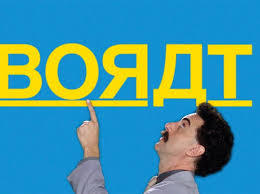 Yes, that is the final name to Borat's 2006 follow-up mockumentary. The title went through many name changes; the previous ones were equally ridiculous and ridiculously long. It also has the dubious reputation of incurring the wrath of many Americans (and Kazhaks) and attracting many legal suits. The Kazaks were just as pissed for depicting them as a bunch of village fools ruled by a despotic regime.
Yes, that is the final name to Borat's 2006 follow-up mockumentary. The title went through many name changes; the previous ones were equally ridiculous and ridiculously long. It also has the dubious reputation of incurring the wrath of many Americans (and Kazhaks) and attracting many legal suits. The Kazaks were just as pissed for depicting them as a bunch of village fools ruled by a despotic regime.If one is looking for a Wodehousian type of humour in this offering, look elsewhere. It is a lowbrow comedy through and through with toilet humour, genitals, menstruation and all.
It was strategically released before the US Presidential elections and contains some not so savoury depiction of Trump's lawyer and former Mayor of New York, Rudy Giuliani, in a hotel room kerfuffle with a young journalist. It is all a prank, and the film is full of it. Borat holds a mirror to the Americans right on their face to showcase their latest embarrassing side. He prods the gullible public in the manner of a naive East European native who is struggling with his English to ask current questions like whether one should vote for the Democrats. Their hypocrisy is laid bare for us to scrutinise.
In a scene, Borat's 16-year-old daughter had swallowed a toy baby figurine on a cupcake. This is obviously referring to the Pizzagate scandal where allegedly prominent figures are involved in Satanic practices like eating babies. She is then brought to a Woman's Clinic for treatment run by a pastor. Borat with his bumbling English telling the pastor, "My daughter got baby in stomach, I want to take out. I give her baby. (referring to the cupcake he had fed her or is it incest he is indicating?)" is just too funny.

The film has another court case against the estate of a recently deceased Holocaust survivor who was apparently tricked into an interview which was subsequently included in the film. Many of the 'participants' in the movie are mere passers-by.
On one side, the viewers will go off thinking that it is a Democrat bashing movie. Then we realise that Trump, his party members and the Republican supporters are also not spared of his caustic sarcasm.
https://fb.watch/1l4jxH57Uw/
 This work is licensed under a Creative Commons Attribution 4.0 International.
http://asok22.wix.com/real-lesson
This work is licensed under a Creative Commons Attribution 4.0 International.
http://asok22.wix.com/real-lessonhttp://.facebook.com/farouk.gulsara
www.riflerangeboy.com
This work is licensed under a Creative Commons Attribution 4.0 International License.

October 24, 2020
He who has the gold, makes the rules!
Feathered Cocaine: The Story of Money, Terrorism and Falconry (2010)
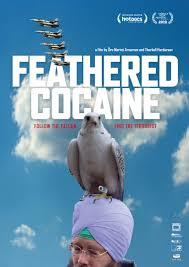
Is not interesting that fifteen years after the apprehension and killing of Osama bin Laden, this documentary is making its round. Perhaps, it is the flavour of the month as the US Elections are just around the corner. Probably because Joe Biden is associated with the old administration, it is a subtle reminder of the evil deeds of the past Government.
Watching this Tribeca Film Festival screened a documentary about falconry, it gave a kind of a deja vu feeling. It reminded me of the many so-called altruistic non-governmental organisation working on humanitarian cause getting a free pass into third world countries and starting to dictate how the host country should be run. Think Red Cross and the Bolshevik Revolution, think IMF and the 1997 economic crisis, think missionaries and the Nicaragua Contra rebels.
Here, in 2010 documentary, Alan Howell Parrot tells the story of his life. Becoming obsessed with falcons, at the age of 18 years, he bought himself a one-way ticket to Teheran. He left his serene life in the lush of Maine, New England to train professionally in falconry in the naked deserts of Iran. Here, he got a revelation of sorts. He realised the high status that falcons commanded in this region. A visit to the Golden Sikh Temple and the last Sikh Guru's, Guru Govind Singh's fascination with falcon made him assume a Sikh identity in appearance and way of living. Historically falcons played essential roles in international diplomacies. Even in Europe, falcons were gifted between kingdom to sweeten business transactions and shipping passage.
He returned to Cornell to study and returned halfway through his studies to the Middle East to legally catch, breed and sell wild Icelandic Falcons (Jer Falcons) to the filthy wealthy Arabs at up to $1 million per bird. Parrot (ironic) found himself mixing with the who's who of the upper echelon of the ruling class of Saudi Arabia, UAE, Iran as well as the infamous fugitive, Osama Bin Laden. The falcons were such priceless commodities, even more, valuable than cocaine. There was a massive demand in the black-market, but surprisingly most Governments are relaxed about curbing this illegal trade. In fact, many countries turn a blind eye to it as it is done in high places.
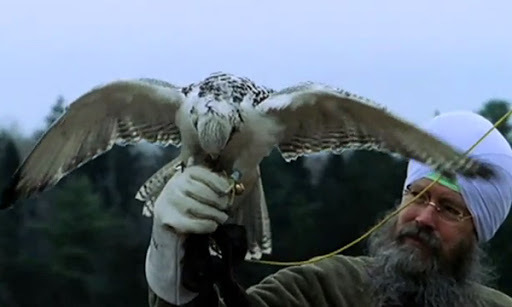 Alan Parrot @ Hari Har Singh KhalsaMany makeshift camps are built in the middle of nowhere in the desert terrains of Afghanistan and Pakistan called Falcon Hunting Camps. Here, Islamic radicals like Al-Qaida meet Arab royalties, and many deals are made. Obscene amounts of cash are given by the opulent royalties to the terrorist group as zakat as an atonement. Osama is known to have presented exquisite purebred falcons as gifts to the members of the Arab royalties. The 9-11 attack was allegedly agreed upon in one of these camps.
Alan Parrot @ Hari Har Singh KhalsaMany makeshift camps are built in the middle of nowhere in the desert terrains of Afghanistan and Pakistan called Falcon Hunting Camps. Here, Islamic radicals like Al-Qaida meet Arab royalties, and many deals are made. Obscene amounts of cash are given by the opulent royalties to the terrorist group as zakat as an atonement. Osama is known to have presented exquisite purebred falcons as gifts to the members of the Arab royalties. The 9-11 attack was allegedly agreed upon in one of these camps.At the heights of the hunt for Osama bin Laden, he was a guest of the Iran government. Parrot and US intelligence were aware of his whereabouts. Despite repeated contact with the US authorities, the message somehow got lost in a bureaucratic maze. Or did it?
Parrot and his agents believe that there is a general malaise to stop this type of clandestine dealings. The black market of falcons has led to corruption against military leaders, political murder, and international terrorism. What is stopping them is money. There is an apparent shady connection between this falcon trade and royal dynasties, the CIA and KGB, the oil industry, American government, and Al-Qaeda. Even the enforcement officials have to line their pockets during the short tenure of their earning life.
" Ultimately, the message that Feathered Cocaine wants to deliver to its audience is not strictly about falcon smuggling or the uncovering of evil plots conceived for ideological reasons. It is by far more pessimistic than that. Feathered Cocaine is one of many untimely records of corruption and greed. Untimely, but at the same time well-rooted in our turbulent globalized age. Power is one and the same anywhere, and terrorism is not but an excuse and a disguise to put the public opinion under pressure. All mechanisms are in favor of the profit of few. Escalation of terror is not going to stop, because involved interests are increasing their magnitude every day. Evidence of this trend is what happened in recent times, with tragedies whose connotations are still unknown to common people; facts like 9/11 are bound to happen again and again, because nobody among those holding power — not only the governments, but the lobbies and the organizations connecting them all — is at this point different in pursuing his main interests. And of course, this interest can be summed up with one name only: Money."
https://icelandchronicles.com/2011/01...
 This work is licensed under a Creative Commons Attribution 4.0 International.
This work is licensed under a Creative Commons Attribution 4.0 International.
Follow
Follow
Follow
http://asok22.wix.com/real-lessonhttp://.facebook.com/farouk.gulsara
www.riflerangeboy.com
This work is licensed under a Creative Commons Attribution 4.0 International License.

October 21, 2020
The higher you fly, the harder the fall!
This is another one of Netflix's productions that hit a snag in India, this time it spurned court cases demanding against its release. Three out of the four episodes in the series were released recently. The fourth episode, a documentary narrating the rise and fall of Ramalinga Raju of Satyam Computers, was successfully stopped at the courts for its damaging portrayal of the man.
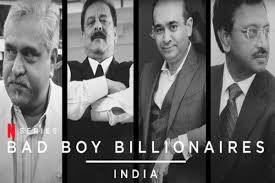 The remaining episodes tell about the escapades of the three Indian icons.
The remaining episodes tell about the escapades of the three Indian icons.Vijay Mallya, a fugitive currently residing in the UK, is also known as the King of Good Times. Born to a beer brewer father, despite the Prohibition of liquor in many states of India, managed to glamourise beer drinking during the dot com bubble heydays of the '90s. From there he went on to the world centre stage through his involvement in the 'no frills' airline business and the F1 races. He made a few shady loans, and soon he was hot on the heels of the authority. He fleed to London and is fighting extradition efforts to India.
Diamondtaire, Nirav Modi, was born into a family that delved in the jewellery business for generations. He was the one who singlehanded showcased the master craftsmanship of the Indian jewellers to the world stage via his international brand that carried his name. He allegedly inflated the value of his own merchandise through sales of his jewellery to different shell companies. His shady loans with Punjab National Bank, however, alerted the lawmen to investigate his dealings. Modi is now seeking asylum in the UK.
 We are familiar with the brand Sahara which use to be displayed proudly on the Indian cricket and hockey team jerseys. Sahara (Saviour) is the name of a financier group created by a rags-to-riches individual named Subrata Roy. At one time, the Sahara group of companies was the biggest employer in India after the Indian Railways. Its primary business was chit fund, a type of savings for the poor. It later ventured into real estate, hospitality, airline industry, healthcare, education and many more. His problems started when he decided to public list two of his companies. This spurred the Market Regulators to look into his company accounts. Despite the repeated accusations and huge fines imposed on the conglomerate, the company's fundamentals are still intact.
We are familiar with the brand Sahara which use to be displayed proudly on the Indian cricket and hockey team jerseys. Sahara (Saviour) is the name of a financier group created by a rags-to-riches individual named Subrata Roy. At one time, the Sahara group of companies was the biggest employer in India after the Indian Railways. Its primary business was chit fund, a type of savings for the poor. It later ventured into real estate, hospitality, airline industry, healthcare, education and many more. His problems started when he decided to public list two of his companies. This spurred the Market Regulators to look into his company accounts. Despite the repeated accusations and huge fines imposed on the conglomerate, the company's fundamentals are still intact.The story of fame and fortune always excites the deprived or those dreaming for the unattainable. Perhaps, the safest way to gather wealth is to do in the sly without kicking much pomp and splendour. Splashing obscene amount of cash for private events always open the eyes of the regulators who had been entrusted with upholding the law, has the Hobson's choice of needing to investigate. No system is leak-proof; it is easy to find a discrepancy. One thing leading to another, years of labour will come tumbling down. The middle ground seems prudent but then how do create something earth-shattering without a thud?
 This work is licensed under a Creative Commons Attribution 4.0 International.
This work is licensed under a Creative Commons Attribution 4.0 International.
Follow
Follow
http://asok22.wix.com/real-lessonhttp://.facebook.com/farouk.gulsara
www.riflerangeboy.com
This work is licensed under a Creative Commons Attribution 4.0 International License.

October 19, 2020
The new norm?
That a look at these two Presidential debates, the first one was in 1960 between JFK and Nixon, whilst the second one happened recently in the year 2020. See the vibes surrounding the two debates. Without a shadow of a doubt, there is much professionalism and decency in the former whereas in the latter we only see crass behaviour and lack of common decency.
In our formative years, we were taught that to listen and to let another to speak are common decencies. Only the immature and ill-mannered interferes one's conversation we were told. We also trained to fight facts with facts, to argue it out like gentlemen in decorum, without being personal or hitting below the belt.
Somewhere along the way, while we were napping, a lot of things changed.
The '90s brought in the internet culture and work ethics of the likes of Bill Gates and Steve Jobs. Workers were expected to dress down to work. Work time needs to be flexible, they said. Jobs is famously known to walk around bare feet and is said to stretch out his naked feet on the office tables whilst discussing work matters with his contemporaries. Seniority went out of the window when open office concept came to being.
Smartphones did not make people smarter. It only built them a personalised echo chamber for them to wallow around in the sweetness of their pixelated self. The 'self-generation' that did not give two hoots about the feelings of the about the other morphed. Under the cloak of anonymity, they would swashbuckler their thoughts with the sorcery of keyboards which are not their views actually but mere parroting of the hidden hands of the cabal.
 This work is licensed under a Creative Commons Attribution 4.0 International.
This work is licensed under a Creative Commons Attribution 4.0 International.
Follow
Follow
http://asok22.wix.com/real-lesson
http://.facebook.com/farouk.gulsara
www.riflerangeboy.com
This work is licensed under a Creative Commons Attribution 4.0 International License.

October 17, 2020
Policing the police?
 Disgruntled expression by citizens after the second wave of COVID linked to free movement of politicians during the recent Sabah state election. This banner prompted the copsto spring to investigate the maker of this banner.
Disgruntled expression by citizens after the second wave of COVID linked to free movement of politicians during the recent Sabah state election. This banner prompted the copsto spring to investigate the maker of this banner.The law (specifically the police) is supposed to serve and protect the public. They are there to maintain law and order so that the general public can perform their society-sanctioned duties - earning an honest living and caring as well as providing for the loved ones.
Of late, these duties (by the police) have been questioned. Are they there to protect the laypeople? Is their presence purely to serve? But to serve whom? Who are their masters?
We all know that the BLM movement that stemmed from policemen's mishandling of black suspect is nothing more than a brain-child of self-serving parties trying to court anarchy to push forward their agendas. One thing led to another. Compilations of previous police brutalities over the years soon instigated people to question whether we need a police force at all. Then, the scream for defunding the police started becoming louder. Imagine a society without the men in blue to police law, order and justice. But do they mete justice? Apparently not.
Closer to home, we repeatedly see enthusiastic men-in-uniform with the excitement of a kid with a candy working around the clock, chasing all avenues to nail culprits who defamed people of stature and in pursuing microscopic shreds of evidence as the situation warrants. Apparently, their excitement gets doused when it comes to nailing down selected kidnappers.
But then...
The world is not a rose garden. There are many wicked people around. They use the evil that lurks within the crypt of their hidden mind to fulfil their hedonistic desire or shortcuts to commit the society-abhorred deadly sins. The laypeople cannot take be empowered to take power to protect themselves in times of adversity.

This work is licensed under a Creative Commons Attribution 4.0 International.
Follow
http://asok22.wix.com/real-lessonhttp://.facebook.com/farouk.gulsara
www.riflerangeboy.com
This work is licensed under a Creative Commons Attribution 4.0 International License.

October 14, 2020
The slippery slope of success
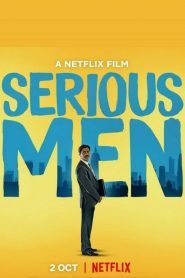 Serious Men (Hindi; 2020)
Serious Men (Hindi; 2020)Article 26 of The Universal Declaration of Human Rights promises free education to all, at least in the elementary stages. It should be equally accessible to all, and parents have the right to choose the kind of education given to their children. Sounds nice on paper, but in reality, this is far from the truth.
It is not a level playing field. How often have we heard of bright students missing opportunities because of their social class, race or simply not knowing the 'right people'? Conversely, so many are elevated way beyond their capabilities because of affirmative actions. Some scaled greater heights as their parents are capable of using their influence or wealth to beat the system or use backdoor means to achieve what they cannot possibly do in a fair game.
The world is not fair. The democratisation of education is only a smokescreen. In reality, it is controlled by the elitist. Schools in the developed part of the countries have better facilities and full-strength teaching force. Students in poor areas have to make do with suboptimal learning conditions. Private schools are paid for by the affluent, and government boarding schools get the undivided attention of rulers as it houses the kids of the elites and students to fit a specific agenda.
Everyone has wised up to appreciate the importance of education. And they all want a piece of the action. The under-privileged use academic excellence as their ticket to extrude themselves from the shackles of poverty. And do not be surprised if they fight for the passport with tooth and nail.
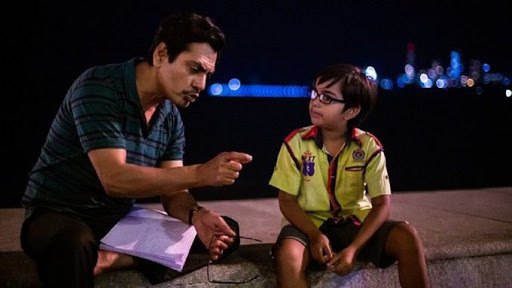 The movie, Serious Men, is a satirical look at the hypocrisy of the society that talks about equality and social justice. In reality, however, everyone is just happy with the status quo. Each uses each other to suppress the one below them, keep them ignorant but instead use the other to springboard themselves to greater heights. The ignorance of the under-class is ridiculed, but the follies by the elites are swept under the carpet.
The movie, Serious Men, is a satirical look at the hypocrisy of the society that talks about equality and social justice. In reality, however, everyone is just happy with the status quo. Each uses each other to suppress the one below them, keep them ignorant but instead use the other to springboard themselves to greater heights. The ignorance of the under-class is ridiculed, but the follies by the elites are swept under the carpet. Like the colonial masters who thought that civilising the natives was the white man's burden, the elitists class believe that they are indeed torchbearers for marginalised. The politicians, on the other hand, make a fool of everyone for their own vested interest.
Ayyan Mani, the protagonist, is a personal assistant to a renowned space scientist. Extricating himself from extreme poverty via education, Ayyan tries to provide the best that education can offer to enjoy the fruit of scholarship. To his disappointment, he meets resistance at all ends. To top it up, his son is a slow learner with hearing impairment. Ayyan concocts a scheme to make his son appear a genius.
This offering ends up as a thought-provoking one. It sneers at our social web and the game that we play to achieve our private intentions. It is well crafted and does not paint the melancholia of poverty, but instead, people in the film have accepted their karmic cycle and carry on with their lives.
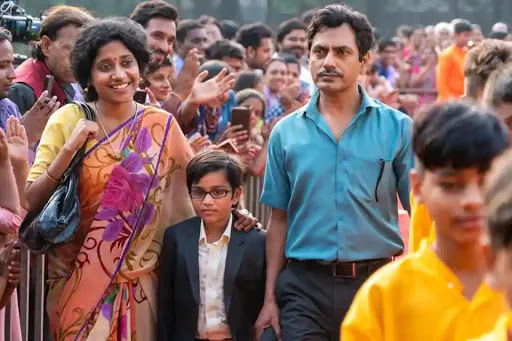 A memorable line in the film reminds us that for a generation to just sit down and enjoy doing nothing, he has to be the 4th generation (4G) enlightened one. The 1st generation (1G) are those who are uneducated but realise the importance of good education. They would break their back to provide basic education for their offspring (2G). The 2Gs will not be among the upper echelon of society but would want their kids (3G) to excel. Life is a race for them to move the family one notch higher. They have no free time. The 3Gs can ponder on mundane stuff like, as quoted, why condoms have dots on them! The 3Gs would have rendered all the luxury in life that 4G can just laze their time away, without having to work.
A memorable line in the film reminds us that for a generation to just sit down and enjoy doing nothing, he has to be the 4th generation (4G) enlightened one. The 1st generation (1G) are those who are uneducated but realise the importance of good education. They would break their back to provide basic education for their offspring (2G). The 2Gs will not be among the upper echelon of society but would want their kids (3G) to excel. Life is a race for them to move the family one notch higher. They have no free time. The 3Gs can ponder on mundane stuff like, as quoted, why condoms have dots on them! The 3Gs would have rendered all the luxury in life that 4G can just laze their time away, without having to work.
This work is licensed under a Creative Commons Attribution 4.0 International.
Follow
http://asok22.wix.com/real-lessonhttp://.facebook.com/farouk.gulsara
www.riflerangeboy.com
This work is licensed under a Creative Commons Attribution 4.0 International License.


